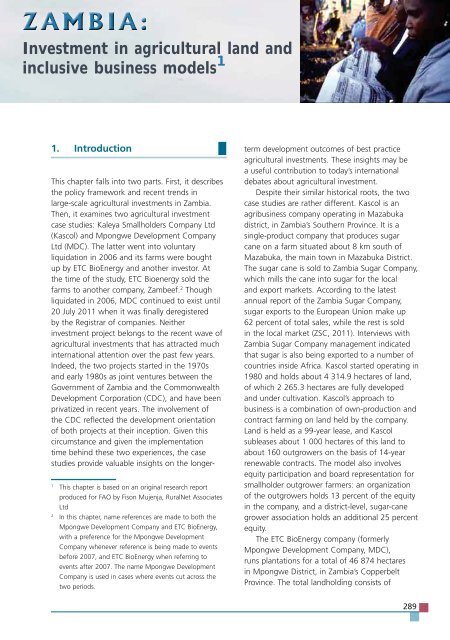TRENDS AND IMPACTS OF FOREIGN INVESTMENT IN DEVELOPING COUNTRY AGRICULTURE
TRENDS AND IMPACTS OF FOREIGN INVESTMENT IN DEVELOPING COUNTRY AGRICULTURE
TRENDS AND IMPACTS OF FOREIGN INVESTMENT IN DEVELOPING COUNTRY AGRICULTURE
Create successful ePaper yourself
Turn your PDF publications into a flip-book with our unique Google optimized e-Paper software.
Investment in agricultural land and<br />
inclusive business models 1<br />
1. Introduction <br />
This chapter falls into two parts. First, it describes<br />
the policy framework and recent trends in<br />
large-scale agricultural investments in Zambia.<br />
Then, it examines two agricultural investment<br />
case studies: Kaleya Smallholders Company Ltd<br />
(Kascol) and Mpongwe Development Company<br />
Ltd (MDC). The latter went into voluntary<br />
liquidation in 2006 and its farms were bought<br />
up by ETC BioEnergy and another investor. At<br />
the time of the study, ETC Bioenergy sold the<br />
farms to another company, Zambeef. 2 Though<br />
liquidated in 2006, MDC continued to exist until<br />
20 July 2011 when it was finally deregistered<br />
by the Registrar of companies. Neither<br />
investment project belongs to the recent wave of<br />
agricultural investments that has attracted much<br />
international attention over the past few years.<br />
Indeed, the two projects started in the 1970s<br />
and early 1980s as joint ventures between the<br />
Government of Zambia and the Commonwealth<br />
Development Corporation (CDC), and have been<br />
privatized in recent years. The involvement of<br />
the CDC reflected the development orientation<br />
of both projects at their inception. Given this<br />
circumstance and given the implementation<br />
time behind these two experiences, the case<br />
studies provide valuable insights on the longer-<br />
1 This chapter is based on an original research report<br />
produced for FAO by Fison Mujenja, RuralNet Associates<br />
Ltd<br />
2 In this chapter, name references are made to both the<br />
Mpongwe Development Company and ETC BioEnergy,<br />
with a preference for the Mpongwe Development<br />
Company whenever reference is being made to events<br />
before 2007, and ETC BioEnergy when referring to<br />
events after 2007. The name Mpongwe Development<br />
Company is used in cases where events cut across the<br />
two periods.<br />
term development outcomes of best practice<br />
agricultural investments. These insights may be<br />
a useful contribution to today’s international<br />
debates about agricultural investment.<br />
Despite their similar historical roots, the two<br />
case studies are rather different. Kascol is an<br />
agribusiness company operating in Mazabuka<br />
district, in Zambia’s Southern Province. It is a<br />
single-product company that produces sugar<br />
cane on a farm situated about 8 km south of<br />
Mazabuka, the main town in Mazabuka District.<br />
The sugar cane is sold to Zambia Sugar Company,<br />
which mills the cane into sugar for the local<br />
and export markets. According to the latest<br />
annual report of the Zambia Sugar Company,<br />
sugar exports to the European Union make up<br />
62 percent of total sales, while the rest is sold<br />
in the local market (ZSC, 2011). Interviews with<br />
Zambia Sugar Company management indicated<br />
that sugar is also being exported to a number of<br />
countries inside Africa. Kascol started operating in<br />
1980 and holds about 4 314.9 hectares of land,<br />
of which 2 265.3 hectares are fully developed<br />
and under cultivation. Kascol’s approach to<br />
business is a combination of own-production and<br />
contract farming on land held by the company.<br />
Land is held as a 99-year lease, and Kascol<br />
subleases about 1 000 hectares of this land to<br />
about 160 outgrowers on the basis of 14-year<br />
renewable contracts. The model also involves<br />
equity participation and board representation for<br />
smallholder outgrower farmers: an organization<br />
of the outgrowers holds 13 percent of the equity<br />
in the company, and a district-level, sugar-cane<br />
grower association holds an additional 25 percent<br />
equity.<br />
The ETC BioEnergy company (formerly<br />
Mpongwe Development Company, MDC),<br />
runs plantations for a total of 46 874 hectares<br />
in Mpongwe District, in Zambia’s Copperbelt<br />
Province. The total landholding consists of<br />
289


